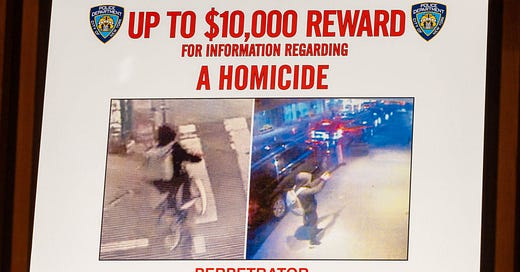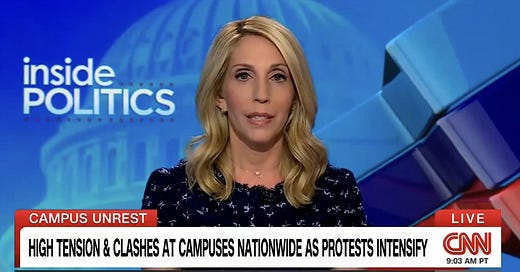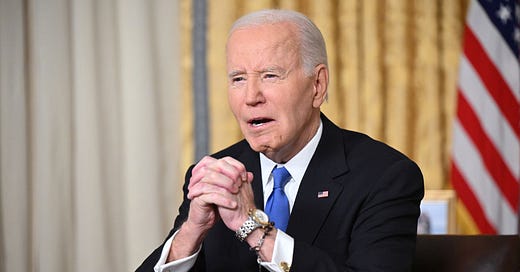
Try Not to Lead a Life That Makes People Celebrate Your Death
The life and death of a health insurance CEO.
Before I started writing this, I was once again investigating what’s going on with my health insurance. I’ll give you the short version: I am on COBRA after getting laid off of my second job in less than two years (this one, in the tech sector, I held for a record-losing two weeks before being told we, the marketing team, weren’t “meeting targets” set by the corporate overlords). I hadn’t even had time to get my health insurance up and running before getting the axe, and then it became COBRA. My coverage comes from something called the SCMA-Member’s Insurance Trust (out of South Carolina), or it’s called PAI, or maybe it’s called Preferred Blue. These are all the names on the card that took me several days on the phone to procure. When I entered my zip code in the search bar for providers on my benefits website, I got zero results. I haven’t had the stamina to investigate why that is or how bad that is, so my health insurance is effectively unusable at the moment.
Lucky for me, I have dental coverage through Delta Dental of Michigan, for some reason. That’s been its own runaround, but I think I’m finally on the books for a cleaning before the end of the year, although I’m assured that if there are any issues with my insurance (the card doesn’t say if it’s a PPO plan, which is all they accept), the dentist’s dedicated insurance-checking team will reach out.
When I got the tech job, I also sprung for vision coverage, as I haven’t had my vision checked since I was a kid. What I patted myself on the back for then is something I can’t bring myself to figure out now.
I promise that is the short version.
Everyone in America has a story like this. Most people know someone with a story that’s far worse: A baby is born and a new parent has to spend hours on the phone begging to get the new human added to their coverage, a spouse dies and then the bills arrive, a house is lost to medical debt.
So I wasn’t particularly proud of my reaction to the news that Brian Thompson, the CEO of UnitedHealthcare, was killed on Wednesday morning as he headed into a meeting with investors in New York City in what’s being called a “brazen targeted attack.” It was the first story I saw, on a friend’s Instagram story no less, when I woke up, and I immediately hopped out of bed and told Will something to the effect of “[Upcoming winter holiday] has come early.”
Now, this is a human life, extinguished—a murder and an assassination. Thompson had a family and people who loved him. So it gives me genuine pause to feel this way, and to spend the entire day seeing people who feel roughly the same or even more gleeful.
In video of the moments just before the fatal shooting, the CEO is walking, seemingly unaccompanied, in Midtown Manhattan, wearing a blue suit. The gunman walks up and shoots using a gun with a silencer. As of today, the suspect remains at large, but police are investigating words that appear to have been carved into the bullet casings left at the scene, which reportedly include the words “delay,” “deny,” and “depose.” The Associated Press pointed out that those words are quite similar to the tactics insurers use to deny claims—“delay, deny, defend.”
Brian Thompson received a $10.2 million compensation package last year, a $1 million base salary along with stock grants and cash. He was also the public face of the largest health insurer in the country, one that allegedly uses a deeply flawed (depending on who you ask) AI model with a 90 percent error rate to deny patients’ care. When patients are denied the care they need to stay alive, they die. This is one of the inhumane truths we’re forced to swallow living in this country, but it’s impossible to separate that truth from the reasons that nearly every comment I’ve seen online about this killing was one of morbid celebration.
In a story about the phenomenon, The New York Times captured this sentiment (emphasis mine):
Stephan Meier, the chair of the management division at Columbia Business School, said the attack could send shock waves through the broader health insurance industry.
About seven chief executives of publicly traded companies die each year, he said, but almost always from health complications or accidents. A targeted attack could have much larger implications.
“The insurance industry is not the most loved, to put it mildly,” Mr. Meier said. “If you’re a C-suite executive of another insurance company, I would be thinking, What’s this mean for me? Am I next?”
If your business profits on the sickness and suffering and death of other people, you should be wondering just that. Frankly, I’m surprised it took this long. After all, at some point, the bill always comes due.


















I am also shocked it took this long. I was waiting for an oil company CEO to be attacked in the early 1990s. Then, I thought maybe someone would go for a tobacco company CEO in the late 90s. But of course it eventually happened to the CEO of a private healthcare payment corporation - the behemoth, cruel middle man that destroys both families and hospitals by denying coverage and reimbursement. This company has killed both people and smaller hospitals that are just doing their damn jobs to heal people.
Yesterday's assassination reminded me of cyberpunk literature, in which people have to buy all sorts of supplemental subscriptions to get healthcare, and corporate executives ('Corpos') have their own police forces and hit squads. Oh wait, that's our world now! Chapo Trap House and Trashfuture are going to go wild with this story.
May the assassin be 8,000 miles away as I type this. Fiji, India, Australia, New Zealand, Vietnam, wherever. I wish them godspeed.
Single Payer. Now.
Ngl, yesterday was one of the more enjoyably feral days for the TL. The ownership class should take note at the outright glee with which 99% of people spoke about this incident. My personal favorite was this Reddit thread:
https://www.reddit.com/r/nursing/comments/1h6i1nl/united_healthcare_ceo_killed_in_targeted_shooting/?share_id=mNnsWkTP6LjwnlIh1soa6&utm_content=1&utm_medium=android_app&utm_name=androidcss&utm_source=share&utm_term=1